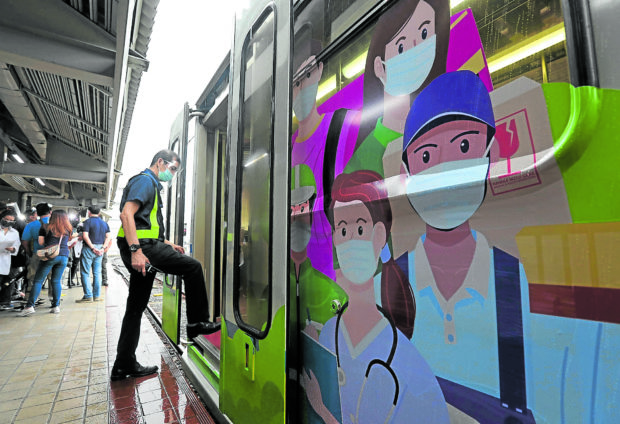
IN STEP A member of the Light Rail Transit’s security boards a coach now sporting colorful images of medical front-liners wearing masks and face shields as part of the metro’s Christ Mask campaign. —MARIANNE BERMUDEZ
MANILA, Philippines — Can the government expect the public to fully trust that the vaccine against the new coronavirus is safe to be used if officials themselves are challenging each other to take it once this has been rolled out in the country?
Although Health Secretary Francisco Duque III and his agency have expressed willingness to be given the first shot of the COVID-19 vaccine, a recent Social Weather Stations survey showed only 32 percent of Filipinos would “definitely” get the COVID-19 vaccine, while another 34 percent would “probably” have themselves vaccinated.
The World Health Organization (WHO) estimated that for herd immunity against the virus to kick in, 60 to 70 percent of the population should be immunized.
Sen. Christopher “Bong” Go, who chairs the Senate’s committee on health,
earlier challenged Duque and vaccine “czar” Carlito Galvez Jr. to get vaccinated to show to the public that the COVID-19 vaccine was safe. In August, Sen. Francis Tolentino made a similar dare to Duque.
On Monday, presidential spokesperson Harry Roque said President Duterte wanted to get vaccinated to show the public that the vaccine was safe.
“I think the President is the best communication tool. So if the FDA (Food and Drug Administration) would allow it, I think the President would be first and he has volunteered. In fact, he really wants to do it,” Roque said.
On Sunday, Vice President Leni Robredo said on her radio show that she supported proposals that public officials be the first to get vaccinated, citing the offer of former US presidents Barack Obama, George W. Bush and Bill Clinton to be vaccinated to help increase public trust in vaccines.
But that must be done “for the right reasons,” she said.
“If the purpose of having them go first is to boost public confidence in vaccination, that’s OK,” Robredo said. “But it’s not right to [push for this proposal] if your goal is to be the first to be protected against the disease.”
She reiterated her proposal that health workers—the ones most vulnerable to COVID-19—be the first to be vaccinated.
In his regular media briefing, WHO director general Tedros Adhanom Ghebreyesus said that while he was open to being vaccinated against COVID-19, he wanted to make sure it was already his turn “because I don’t want to take anybody’s vaccine.”
Given that available doses are expected to be limited next year, medical front-liners are the top priority for vaccination.
Approved by regulators
Amid the dares to take the vaccine as well as the barrage of falsehoods from antivaccine groups, Health Undersecretary Maria Rosario Vergeire on Monday stressed that once a COVID-19 vaccine is rolled out in the country, the public can rest assured that this has been properly scrutinized by experts and regulators.
“Once these vaccines enter the country, these will be evaluated by the vaccine expert panel and the Food and Drug Administration. So there is nothing to worry about these vaccines because they have been tested to be safe and have met their target efficacy,” Vergeire said.
“The secretary of health and the entire DOH, if I may say, are open and if it is needed that we be the first to be vaccinated, we will have ourselves vaccinated,” she added.
To help ensure that the public is provided with the right information on the COVID-19 vaccine, Vergeire said the DOH had prepared a communication plan where local officials will help explain to their constituents the advantages as well as the expected side effects that are inherent to the vaccine.
To have an effective pandemic response, Dr. Anthony Leachon cited the “Swiss cheese model,” which points out that “no single intervention is perfect at preventing [COVID-19’s] spread.”
“Government message and funding are key factors to vaccine rollout success,” said Leachon, a former adviser to the government’s COVID-19 response.
Local clinical trials
Vergeire said that of the five manufacturers eyeing to hold clinical trials in the country, only China’s Clover Biopharmaceuticals has obtained clearance from both the vaccine expert panel and the ethics review board.
So far, AstraZeneca and Johnson&Johnson have been cleared only by the ethics review board, while Sinovac has secured the approval of the vaccine expert panel.
Russia’s Gamaleya Research Institute has yet to pass both evaluations, which are done in parallel and precede the FDA’s approval.
Vergeire, however, said the FDA was already “gathering initial information” on all five so that it could already start the documentary evaluation of their applications.
On Monday, the DOH recorded 1,574 additional coronavirus infections, raising the national tally to 441,399 cases. Davao City reported the most number of new infections, 187, followed by Rizal (96), Pampanga (80), Quezon City (69) and Pasig (59).
The DOH said 80 more patients had recovered from COVID-19, bringing the total number of survivors to 408,702. The death toll, however, increased to 8,572 as 18 more patients died.
The recoveries and deaths left the country with 24,125 active cases, of which 84.6 percent were mild, 6.4 percent asymptomatic, 0.32 percent moderate, 2.9 percent severe, and 5.8 percent critical.
—With reports from Leila B. Salaverria and Krixia Subingsubing